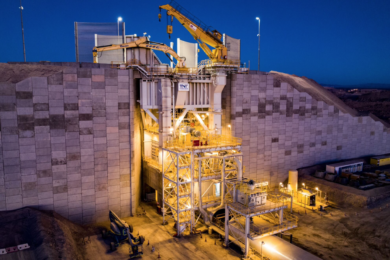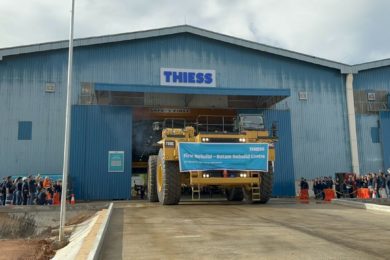Amidst a scramble to acquire capital for reinvestment in the mining industry that is showing signs of a revival following the commodity price slump, a group of executives participating at the 2017 Investing in Africa Mining Indaba in Cape Town deliberated the means of escaping the boom-and-bust cycle endemic to the mining industry.
“First we need to agree that I am sick. I have been diagnosed. And I should see that I need a doctor so that I can really get better. You must come to this point of realization. As long as there is denial and you think you are doing well, then you see no need to change your behaviour and practices,” Phillip Tobias, Chief Operating Officer of Harmony Gold Mining said during a panel discussion of DuPont Sustainable Solutions at the Mining Indaba.
Johan van der Westhuyzen, Managing Director of DuPont Sustainable Solutions (Turkey, Middle East and Sub-Saharan Africa), who facilitated the panel discussion on safety and productivity, emphasized that a cultural change within organisations was imperative to drive actual improvement. Introducing new technologies or new processes are simply not enough.
Van der Westhuyzen said “safety and productivity is often a contradiction for many companies, but what you see is that often when you see accidents it is because the company is only focusing on production and that the focus on safety is neglected”.
“There cannot be productivity without safety. It is not only about production. It is about safe production. If you look at statistics in the mining industry, you will agree there is more we can do. There is more we need to do in order to manage this better. The level of risk that we accept, and the understanding of risk in the mining industry is something that we would like to discuss more. With greater complexity comes greater risk. I think the silo approach – when there is no communication, when you have a lot of things happening, when the commodity prices are low – increases the risk,” he stated..
Tobias expressed that leadership changes must take place – with leadership influencing all levels of operation. “For us, mining is still a people’s business. Regardless of the smart idea you are going to put out on the table, make sure the people in the front line, those that are going to execute, see what you see. Let them become passionate about what I am passionate about. There cannot be a disconnect with the man at the coal face.”
“Concepts we adopt, are the intensive care unit approach (ICU approach) where you identify your bottom third performers, adopt them, get close to them, give them the tender loving care. When you are in ICU, you need special care, the nurse has to check your pulse regularly, not once every few months. These are some of the concepts we use where management gets very close, identify the gaps and then provide the service they need.”
Tobias spelled out the huge safety successes of the last couple of years. “We will not rest until we achieve that zero objective. If you look from where we have come from – over 400 fatalities a year not long ago, down to over 200 and now less than 100. But it is still 73 employees too many, but we believe we are making good progress.”
Tracey Kerr, Group Head of Safety and Sustainable Development of Anglo American said “a huge effort was made the last two years to simplify operational and safety procedures. Part of the problem was over complicating the standards and procedures.”
Cornelia Holtzhauzen, Regional Director for Advisory of the Hatch group said safety starts with people. “One of the learnings we have had in implementing technology is that it is not a plug and play action to be automated. We actually start with safety. Because if you get the safety basics in place, productivity will follow, she said.
“Change management, your leadership, your culture and technology is a small player in assisting the company in becoming great and better. And to allow everyone to walk the journey towards your dream,” she said.
A live poll from the audience participating in the discussion showed the following results:
- 35% of participants felt that over the next five years the biggest influence on their business will come from higher expectations from stakeholders and increased government regulation. Whilst only 5% said it would be from increased cost, 5% attributed it to low productivity and 10% to market volatility
- The poll showed that 53% believe an integrated approach to operations will be the biggest opportunity in the next five years to improve efficiencies, whilst 11% said it will come from technology and technical solutions. 16% said specific sources of waste must be identified and addressed and 21% argued that the focus must be on people and behaviour.
- A whopping 70% of respondents said the biggest opportunities in the next five years for improved efficiency will come from automation and “Big Data”, with only 17% identifying mining design and methods as a driver
- 53% said leadership development should be the resource that should be focused on over five years to ensure improvement that the empowerment and commitment of employees are improved, with 35% saying talent should be effectively deployed throughout organisations, 6% said it will be achieved by attracting new talent and 6% believing current talent should be retained.
As one of eight DuPont businesses, DuPont Sustainable Solutions (DSS) is a leading provider of world-class operations consulting services to help organizations transform and optimize their processes, technologies and capabilities. DSS is committed to improving the safety, productivity and environmental sustainability of organizations around the world.










